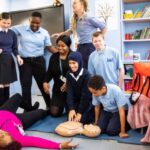Learning for Life
Learning for Life
Engagement Pathways
Our vision
Our vision is to seek an enriched understanding of the needs of our children, so that the response is targeted and effective, delivering the best possible outcomes. Through our experience, and the skills and expertise of the staff at the school, including the thoughts and wishes of our children and their parents, we seek to ensure that;
- Each child receives high quality teaching, which develops social and self-care skills for future independence.
- Our children have access to support groups with their peers to help them develop friendships and interests.
- Each child feels confident and respected by others and has the opportunity to experience success and achievement at every level.
- Each child benefits from the outcomes of physical and emotional wellbeing, as well as communication and personal safety, to encourage higher levels of enjoyment, achievement, and feelings of value and respect.
Believing that to truly flourish children must feel valued, we focus on what each child can achieve and celebrate their successes. Recognising that every one of our pupils has quite specific requirements, we also place great importance on personalised learning. By bringing learning to life through trips, clubs, work experience and other extra-curricular activities, we encourage independence and develop the interests that help prepare each child to take their place in society.
Values
As a school, we believe in working together towards one common goal. Our values are reflected in everything we do, at all levels, in order to inspire teachers, pupils, parents and the wider community:
- Community: We believe that every person at our school has something to offer, helping us to create a united environment. Our sense of community is founded on the fact that we all must work together to achieve the very best. Sharing a common purpose, each individual plays a key role in helping everyone to feel valued and a part of our ‘big family’.
- Inclusion: We believe in creating a community for everyone, going the extra mile to ensure our children can flourish, no matter who they are or where they come from. We are prepared to take risks to ensure no one finds themselves isolated and alone, but instead become a place where each child feels part of the school and local community.
- Innovation: We believe in inspiring individuals to become creative thinkers, with the power and potential to make dreams become realities. We aren’t afraid to tear down walls and build bridges and encourage creative, positive and hopeful mindsets that see beyond current realities and ‘dream’ of what can be.
- Kindness: We believe that one act of kindness can change a person’s day and can even change lives. Therefore, we encourage children to always be considerate of other people’s feelings and situations. In a world of judgement and exclusion, we inspire our community to always be caring and kind to others.
Curriculum Intent:
Everything we do at West Lea is focussed on providing ‘Learning for Life’ for pupils aged 4-25 with special educational needs. Our aim is to work beyond standard models of education and take into account our children’s needs, capabilities and aspirations for the future. Our overarching vision and values are firmly embedded within our curriculum which aims to achieve the following:
- Provide ‘learning for life’ and not just learning for learnings sake; the curriculum facilitates the acquisition of a ‘suitcase of skills’ and knowledge that will equip each pupil to reach their full potential and become active citizens within their local community.
- Instils a greater understanding of the local community and the world of work and promotes active participation.
- Is creative, fully inclusive and engaging for all learners.
- Maximises opportunities to ‘develop communication’ and social skills in order to develop meaningful relationships and build support networks.
- Promotes learning through wider enrichment opportunities including activities, trips and visits to broaden horizons, raise aspirations and develop cultural capital.
- Promotes choice, pupil voice and innovation, empowering pupils to be ‘problem solvers’ and ‘independent learners’.
- Provides pathways to employment and helps to prepare them for adulthood through clear progression routes across the key stages and beyond.
- Is personalised and looks to celebrate the interests and achievements of each child, within the context of his/her abilities.
- Instils core values of kindness, consideration, resilience, respect, and responsibility.
Learning for Life
“Every moment of the school day is about improving learning for pupils.”
OFSTED
West Lea in Context
West Lea school comprises 3 campuses (Meridian, Haselbury and Learning for Life) which is split across 9 sites. The school caters for pupils with a range of complex needs including ASD and a growing cohort with severe learning difficulties. We also run two sites specifically catering for pupils with social, emotional and mental health needs (SEMH). As a school that responds to need in the Borough we have set up various provisions for pupils across Enfield to address gaps and ensure fair access to opportunity including:
- Supported Internship Programme (16-25 year olds)
- Independent Travel Training Programme
- Attendance Support Service- supporting pupils across Enfield with medical needs and those who are not accessing education due to SEMH needs. This includes support for children in North Middlesex Hospital.
- 2 Charity shops, eBay shop and a coffee cart for retail and barista training/volunteering.
- Work experience programme for all KS4/5.
- KS5 study programmes based in Enfield College.
The above provision intends to expand pathways for young people with SEND and create meaningful opportunities for work and independence in a landscape where these are often limited. The 2016 SEND review in Enfield highlighted gaps in employment pathways including access to voluntary work, travel training, vocational training and social enterprise opportunities as well as poor employment outcomes. This is in keeping with the national picture which indicates that:
- 65% of people with a learning disability want to work, but only 6% are in work (Mencap).
- Disabled people are 4 times more likely to be out of work than non-disabled people (Joseph Rowntree Foundation).
- Disabled people are 3 times more likely not to hold a qualification compared to non-disabled people (Statistics Disability facts and figures/Department of Work and Pensions 16th January 2014).
As a school our curriculum is designed to challenge the status quo and prepare our young people for adulthood. We have developed or expanded provision, in partnership with the LA, to address the gaps within the SEND review. The curriculum is therefore more aspirational for our young people, which includes giving them opportunities to travel independently, experience both college and work, practice living skills through residential opportunities and also access driving lessons.
The school curriculum is still developing and expanding to address “the limited choice of entry-level courses in further education that do not build on what has gone before, or prepare young people for life and work; poor quality work experience; and a lack of supported employment opportunities to help them prepare for, find and retain work.” (The SEND Green Paper Support and Aspiration 2012).
The wider community is also considered within the context of curriculum to ensure learning and skills acquisition are in line with pathways that are appropriate, meaningful and relevant to the young people that we serve. We therefore ensure strategic involvement with local industry/sector forums, regeneration and other strategy and development networks. Resultantly, Internships and work experience have been incorporated into Council wide policies and processes. The school curriculum visibly dovetails with the Preparing for Adulthood outcomes of employment, independent living, friends, relationships and community and good health. It also responds to varying needs and pathways of our pupils rather than a ‘one size fits all’. There are common denominators which thread through all curriculum areas as they represent the overall intent, however subject areas, content and associated qualifications are considered for each group/pathway.
Curriculum Design
West Lea aims to personalise and differentiate learning through its design of a layered approach to the curriculum. Through a thorough understanding of the learner’s knowledge, skills and levels of understanding the school places children in one of two pathways as they move through the school, blue or green. This ensures that students are matched well to the most appropriate provision, however they are never limited by the pathway as they are taught according to their own needs and abilities within this flexible layered approach.
The curriculum is as complex as our learners. It is based on West Lea’s Learning for Life ethos, the National Curriculum and accreditation at KS4 and KS5. It is tailored to the strengths of the child and aims to develop confident young adults with the skills to be successful in life, in relationships and in work. Our ethos is at the heart of our curriculum and is supported by a ‘Passport’, which is an engaging tool that children use to capture the life skills they acquire throughout their West Lea journey in a child friendly way. Learning takes place all the time, formally and informally, from the moment our young people arrive in the morning until they go home at the end of the day.
By the time the students have completed KS1 they will either follow a formal/semi-formal pathway (Blue) or a pre-formal pathway (Green). Prior to this they will follow the principles of the EYFS framework and 7 aspects of learning.





